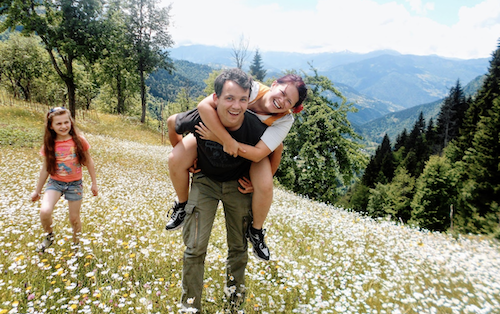Who are you?
I’m Crystle-Day Villanueva from California. My hometown, Hayward, is just a 30-minute drive from San Francisco. My parents are from the Philippines, so I am a proud second-generation Filipino American.My boyfriend, Julian Brown, is from South Africa. He grew up in the lovely wine region of Stellenbosch, which is 50km from Cape Town. Julian comes from a small and loving Afrikaans family.
Where, when and why did you move abroad?
In 2012, as strangers on opposite sides of the world, it seemed that both Julian and I were having a quarter-life crisis. Julian was working full time as an auditor in Cape Town and simply detested it. Coming from a family of intelligent educators, he took action enrolling and completing an intensive TESOL course. With Julian’s newfound certification, he was ready to take on a new career.
While I was in the middle of seasonal work in the tourism industry between Colorado and Alaska. Recovering from ACL surgery made me unable to fulfill my job in Alaska. Jobless in California, I was prepared to take on something new. Coincidently, Julian and I both applied and got accepted into a volunteer program for teaching English in the Republic of Georgia.
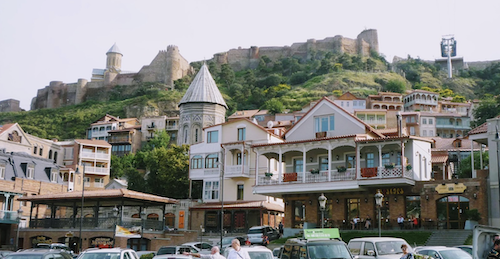
TLG took us out to explore Old Town
Why Georgia? It’s because it’s a country not many people have ever been to or even know about. It seems Julian and I were both just ready for an adventure without expectations. Luckily it was the decision that brought us together! We’ve been together now for 6 years and have lived in 5 different countries.
What challenges did you face during the move? How did you find somewhere to live?
Through the “Teach and Learn with Georgia” program, they would assign us host families to live with in designated villages. What was difficult was that we wouldn’t know our placement until a few days into our orientation. It was a bit nerve-wracking flying into a country and not know where exactly where we would live or who with. Makes it tricky for packing as well.
Were there many other expats in your area?
“Teach and Learn with Georgia” is a program run by the local government. They had an in-depth screening process for host families. The mission of the program is to expose the country to as many English speakers in as many rural villages as possible. As a result, it wasn’t common for a village to have more than one expat.
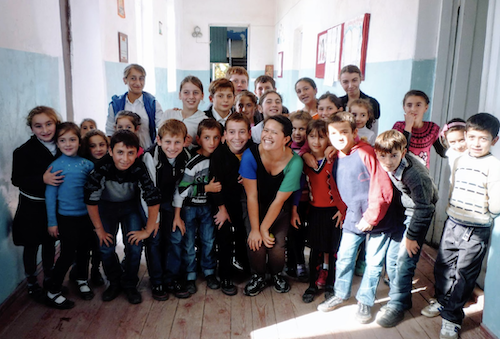
The majority of the expats were quite spread out. You were fortunate if the nearest expat to you was a 45-minute drive. Since the country was so small, expats often bumped into each other on weekends in bigger cities like Zugdidi, Batumi and Tbilisi.
What is your relationship like with the locals?
I had a great relationship with my students in my village. I often took time to play with them, which isn’t common especially for female teachers in Georgia. I also tried to spend as much time as I could with each student of varying ability, which deepened the trust between us. Since platonic relationships between genders don’t really exist in the country, I had to keep a distance from most of the men in the village. My host family was kind and I know I was welcomed intimately but the cultural differences made it hard for them to understand my desire for personal space and independence as an American woman.
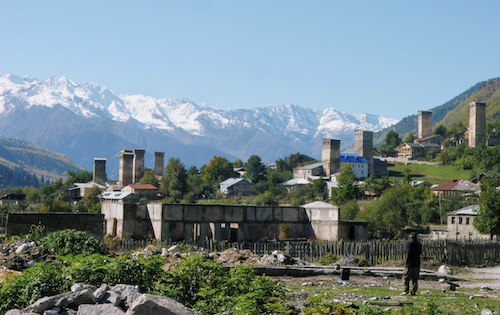
Julian’s experience was the complete opposite. He wasn’t taken very seriously at his school since he was seen as more of a threat to local teachers. In contrast, Julian’s initiative and ability to learn to speak Georgian well allowed him to get close to his host family. Being placed in a more remote area in the country, he was expected and encouraged to participate in the chores. Julian would chop wood, scythe in the fields and help heard the cows. Sensing that Julian enjoyed contributing to the community and gaining a good grasp on Georgian, he became well-known in his village and was often invited to drinks and meals with neighbors.
What did you like about life where you were?
Traveling and the people! Georgians are some of the most welcoming and kindest people we have ever met. They are always willing to share and give no matter how much or how little they have. Their hospitality is simply touching. As an example, my colleague and her husband insisted that Julian and I take their bed and they slept on the couch when we spent the night. Even strangers, who hardly know you, will go out of their way. I’ve met a family who offered me a ride then treated me to lunch. I’ve also met another gentleman who found out I was going to a birthday party, so he bought me chocolate and cognac to give to my friend as a gift.
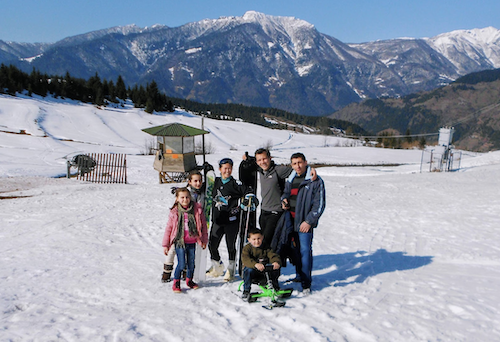
Traveling in Georgia isn’t the easiest but if you want adventure and raw authenticity of historical and cultural sites, this is the place. Vardzia is a huge, active cave monastery where priests still actually live. Sighnaghi is where the traditional form of producing wine in large clay pots, which are buried in the earth, is practiced. Mestia is located in Caucus Mountains where ancient stone defensive towers still stand in their original form. Despite its small size, the country has breathtaking landscape and hidden gems.
What did you dislike about your expat life?
Culturally, Georgia is behind the rest of the world when it comes to equality between men and women. Men and women aren’t allowed to have platonic relationships outside of the family. They have specific gender roles and must adhere to them. As a women I wasn’t allowed to play poker with the Georgian men, much less go hiking, hunting or fishing with them. As a woman I was expected to participate with chores like cooking and cleaning but since I was a guest, my host family would refuse any offer of help I gave. My male friend, who was a chef in the States, struggled to convince his host mother to let him cook for the family. If men are seen doing women’s roles, it’s a symbol that the woman is devalued and can’t perform her role properly. It’s difficult to live with a host family and want to contribute or be part of the community when your gender prevents you from doing so.
What was the biggest cultural difference you have ever experienced between this country and your life back home?
The most shocking was the lack of platonic relationships between men and women. This complicated things because even the smallest interactions could be misinterpreted. In training, all the women were taught NEVER to smile at Georgian men. Why? Because this was practically an invitation for sex. Coming from California and being a naturally happy person, this was no easy feat. Imagine trying to give compliments, show gratitude or express your satisfaction, and not being able to let your face show it. Needless to say, myself along with a handful of other expat women bought fake wedding rings and pretended we were married to avoid harassment after an unconscious smile.
For Julian, it was the expectation to always drink alcohol and get drunk. Drinking is a huge part of the culture. As a woman, I can refuse a drink, which isn’t the case for men. Men prove their masculinity by drinking alcohol and are expected to do so. It’s also how men bond in the culture. No matter the place or the time of day, a drink will be placed in a man’s hand. To represent the degree of how much Georgians can drink, they laugh at Russians for not being able to hold their liquor! Julian basically had to be a functioning alcoholic in Georgia. Even our Irish and Australian acquaintances would complain about being drunk for an entire week and being just exhausted.
What do you think of the food and drink in this country? What are your particular likes or dislikes?
Particular favorites foods would definitely be Khachapuri, Khinkali, Badrijani, Churchkhela, Qveli and Satsivi. Khachapuri is a bread dish stuffed with cheese. What makes it special is each region has its own form of Khachapuri. The Adajaruli Khachapuri is beautifully shaped with a raw egg in the middle, slathered with butter. The Svaneti Khachapuri has traditional cheese stuffed with meat.
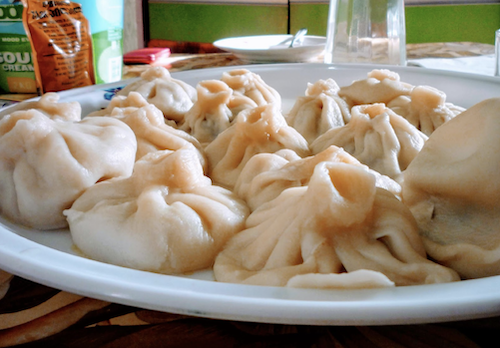
Locals always test an expat’s ability on how to eat them.
It’s not as easy as you'd think!
Khinkali are like huge dumplings, filled with meat and broth. There are several flavors and learning how it eat one properly, is a test.
Churchkhela is dessert made up of dried fruit juice with nuts. They look like colorful candlesticks and are often sold hanging from shops. One of our favorite Georgian snacks is Qveli, which means cheese. Specifically we love the roped, thin braided and overly salted cheese which goes great with beer! Julian is also a big fan of Satsivi, which is a walnut sauce they make for a turkey dish.
Our favorite drinks would definitely be Zedazeni and Natakhtari beer. Not that it is particularly special at all but more about the serving sizes it comes in. We miss our two liter bottles of beer for $1 (in 2013)! Chacha is also something we miss. It’s a homemade spirit similar to vodka. Not the best taste, but definitely not the worst. What makes it unique is the warmth you feel of the drink going down into your belly. Plus it usually gives people a happy and giddy buzz. For hangovers and upset stomachs, we miss Borjomi. A mineral water produced locally which took some time getting used to, but soon became our go-to after nights of drinking.
A general dislike we both share is Georgian pizza. The pizza itself is okay, but it’s the fact they love to put mayonnaise all over the top of it! We specifically had to ask for them to make pizza without mayo.
Georgian food can be quite interesting, but is relatively normal and safe. You don’t need to worry too much about intense spices or question what you are eating. Georgians love their salt! Many of the expats found some of the local food to be overly salted for their liking. Most Georgian foods, especially home made, can also be quite bland at times so perhaps that’s why they love salt.
What advice would you give anyone following in your footsteps?
Living in Georgia was one of the most difficult but rewarding experiences we have ever had. Teach and Learn with Georgia was a great program for full integration into a community. Yes, you take a risk not knowing where you’ll be placed or what your school or family is like, but it’s a true adventure!
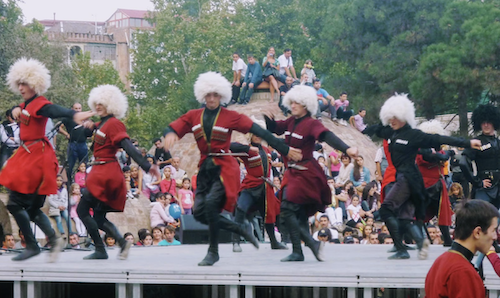
It taught us patience, how to be humble and not take things for granted. It’s not suitable for everyone. Try to be open-minded and understanding that this isn’t a wealthy country. Wifi, TV, indoor heating and hot water are part of Western comforts and aren’t always guaranteed.
Avoid making constant comparisons between your home and Georgia, it’s only going to make adapting harder and you more negative. Instead try to be open-minded and respectful of their culture. It may be different but just remember, after it all, you’ll have some amazing stories to tell.
What are your plans for the future?
After Georgia, Julian and I continued to teach English and moved to Turkey, China and South Korea. We are now living in Bogota, Colombia. So far we really enjoy the lifestyle in Colombia and the many possible career opportunities. Julian is now teaching Business English for big corporations like Adidas and Epirock which he enjoys. While I just accepted a new position in the tech industry as a marketing writer. I’m excited about the challenge and professional development. Overall, our year living in Georgia opened so many doors for us and allowed us to further our careers and travel experiences. Julian and I are looking forward to staying in Colombia for a bit but we always look back fondly on our time in Georgia.
You can keep up to day with Crystle-Day and Julian's adventures on their blog, Wandering Excursions, and on Instagram.
Would you like to share your experience of expat life with other readers? Answer the questions here to be featured in an interview!

